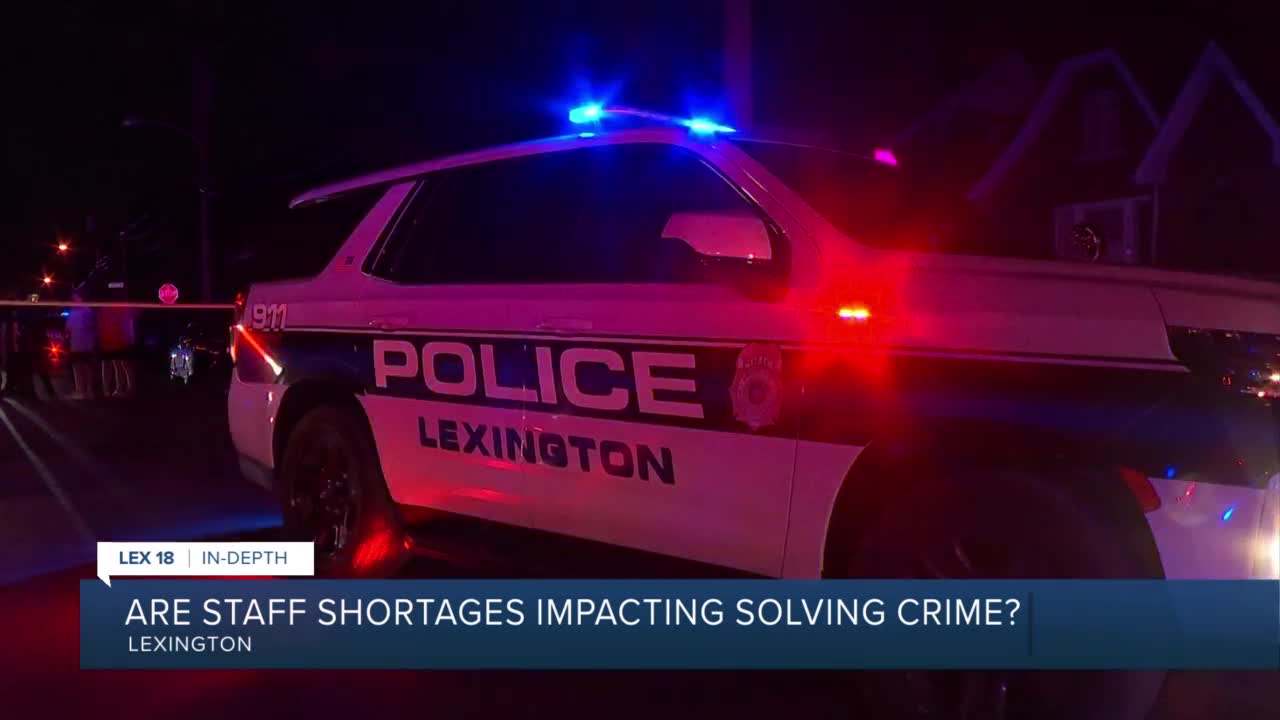LEXINGTON, Ky. (LEX 18) — As the Lexington Police Department looks to fill 86 sworn officer positions, the personal crimes section says they are fully staffed.
From Sep. 1- Sep 15, eleven people have been shot and three people killed in Lexington.
“If you had seen these last couple of weeks, the amount of effort and time our police have spent working on issues — the dedication, the personal dedication they take in making this city safe, you know why I always say we set the standard,” said Chief Lawrence Weathers on Monday.
Weathers said they are maintaining minimal staffing levels and supplementing with overtime when they can’t.
With 35 homicides reported so far this year and nearly 100 shootings, officers have regularly utilized overtime to respond accordingly.
Beyond the numbers are the families whose lives have been changed forever.
Many are still looking for answers. Because of this, LEX 18 met with LPD to figure out the impact this kind of shortage might be having on solving these murders.
Lt. Brian Peterson with personal crimes says their section, which is composed of the homicide, robbery, and personal crimes unit, has 21 detectives and is consistently fully staffed.
For that reason, they don't feel that not having more detectives is impacting arrest rates. However, Peterson says that while they aren’t short-staffed, they wouldn’t turn down extra help.
He says officers are just passionate about their community and doing the best they can with what they have.
“Our detectives are very — they're going through a lot,” said Peterson. “They'll put in a full eight — or nine-hour day today, and then something will happen tonight, and you know, they got to stop what they're doing, step away from dinner with their kids and family, and come out here and work five, six hours and then come back in tomorrow and do the same thing. So, there's definitely the pressure on all of these people constantly. So yes, we need help.”
MENTAL TOLL
Peterson says the real toll is the mental strain.
The city has been offering help for officers through counseling and peer groups to help officers deal with the trauma caused by the increase in violence.
“It goes back to just mental well-being. These detectives, they want to be here. They're highly experienced. They've done this for a while. They work very well as a team. But you can only ask so much of a person, right? They've got kids. Other considerations at home. There may be special circumstances at home above and beyond just your typical family. So, we always have to keep that in mind because we are asking these men and women to give above and beyond. I think I could say what we used to 10 or 15 years ago,” said Peterson.
When a homicide happens, one detective takes the lead, but he also has a team of officers behind him, forensic services, unit crime analysts and help from other bureaus.
CASELOADS AND CLEARANCE RATES
Nationwide, officers are leaving the profession in droves. The trend started happening after 2020 as violent crime also increased.
“I guess it surprises no one, but at a time when things like COVID were making staffing quite difficult for police departments at the same time, there was a huge jump in murders and police were overwhelmed,” said Thomas Hargroves, Founder of the Murder Accountability Project.
The non-profit tracks unsolved murders nationwide and police accountability.
Hargroves says the types of crime are different, police have been underfunded since the recession in 2008 and community relationships have changed since the protests of 2020.
“There has been a growing disconnect between the police and the communities they serve,” said Hargroves.
On Monday, Chief Weathers said he didn’t feel like the lack of trust was earned by his officers.
“Probably in another state. Our police officers have always been trustworthy far and wide,” said Weathers.
While LPD did not share caseloads per detective (because they say it varies) studies have shown that caseloads play a big role in solving homicides.
A 2008 FBI study concluded that departments whose detectives had fewer than five cases a year had higher arrest rates.
“Right now, it's manageable. We're doing a good job about that, about keeping track of how they're doing, talking to them, and they know to let us know if they need to take a break,” said Peterson.
Hargroves says Lexington is doing well compared to other cities of its size.
“Lexington is significantly more likely to solve homicides than most cities your size,” said Hargroves.
The Murder Accountability Project estimates that in 2020, the most recent year for which we have complete data, the nation hit an all-time low of 54% of all murders were cleared.
Here is Lexington’s clearance rate over the past 5 years:
2017 - 82%
2018 - 70%
2019 - 73%
2020 - 82.35%
2021 - 46%
Stats don’t tell the full story, but for context, Peterson says the 30% drop from 2020 to 2021 could be attributed to the increase in population.
Arrests have been made for 19 homicides so far in 2022.
COMMUNITY HELP
For those still waiting for answers and arrests in their cases, LPD says to continue calling if you don’t get through the first time. If you leave a message, it should be returned.
More than anything, Peterson says they need tips from the community to close cases. Residents can submit a crime tip 100% anonymously through Bluegrass Crime Stoppers.
“Cooperation from the community and just getting people to come forward with information. That's really the biggest thing that we can ask, the biggest help that we can have in solving these cases and even preventing some of this from happening," said Peterson.
Chief Weathers says in addition, showing appreciation for officers, E-911 workers, EMS, and Fire goes a long way during this time.




